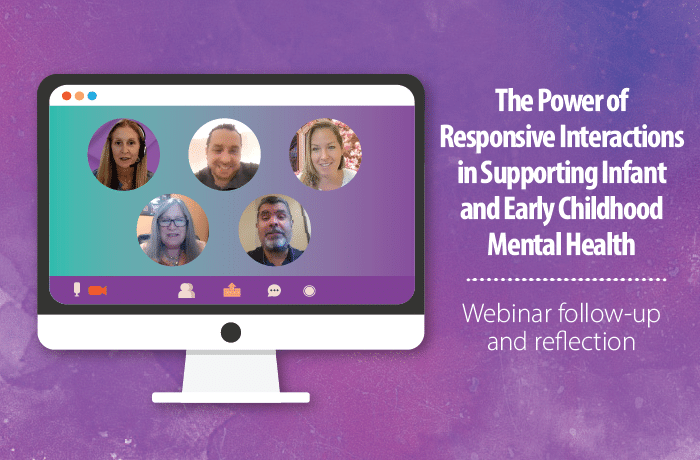Responsive, nurturing relationships with adults do good things for young children’s mental health and social-emotional development. That’s not exactly a controversial thing to say. It’s something most everyone would agree with, just based on intuition. Thanks in part to LENA technology, though, we can move beyond intuition.
There’s a clear and important link between conversational turns and social-emotional development in infants, toddlers, and preschoolers. Conversational turns, just simple verbal interactions between an adult and a child, are so much more than mere “baby talk.” They’re powerful. They are linked to changes in the very structure and function of a child’s brain. And those changes happen in the first years of life, right when the brain is most plastic and most receptive to change based on environmental factors.
Recently, LENA brought together a panel of researchers, clinicians, and policy experts to discuss young children’s mental health, specifically in the context of the interactions and relationships with the adults in their lives. Stream the full recording here, and watch some of the highlights below. The full webinar is available in both Spanish and English.
“When we move from reactive relationships to responsive relationships, we can see changes in the children.”
Javier Nieves, an infant and early childhood mental health clinician at Montclair State University’s Center for Autism and Early Childhood Mental Health, emphasized the importance of moving from reactive to responsive relationships. “No matter how small the children are, the body keeps the score,” he said. For adults, making space to reflect on the nature of their interactions with young children is crucial.
Using LENA technology to understand how conversational turns influence challenging behavior
Kathryn Humphreys, director of the Stress and Early Adversity (SEA) Lab at Vanderbilt University, stressed that LENA technology gives researchers special insights into the everyday lives of young children. Beyond controlled laboratory experiments, and beyond parent surveys about their children’s development, LENA technology provides detailed data insights on how children interact with the adults they live with and learn from. In one study, for instance, researchers at the SEA Lab found a statistically significant correlation between adult interactions in infancy and decreased symptoms of psychopathology, more commonly known as challenging behavior, in toddlerhood.
Conversational turns as a “training ground” for emotional regulation
In one groundbreaking study, Esteban Gómez Muzzio tracked the social-emotional development of a group of children in Santiago, Chile, from toddlerhood through preschool. Gómez Muzzio is the co-founder and executive director of Fundación América por la Infancia. Using LENA technology, he discovered a causal relationship between conversational turns at 18 months of age and social-emotional competencies at both 30 and 77 months of age.
He elaborated on what it is about conversational turns that make them so impactful, as well as the importance of implementing programs that emphasize their role in social-emotional health. “Building these conversations is an important element to include in programs that want to promote social-emotional development and early childhood mental health,” he said.
For example, LENA Grow, an evidence-based professional development program for early childhood educators, has been shown to increase scores in all domains of the Devereux Early Childhood Assessment (DECA), including Initiative, Self-regulation, and Attachment/Relationships, as well as Total Protective Factors.
The clip below is in Spanish, captioned in English.
Pairing LENA technology with fMRI technology to study how conversational turns shape the brain
At the SEA Lab, in partnership with Stanford University’s Brain and Behavior Infant Experiences (BABIES) Project, Humphreys has also used fMRI technology to draw a connection between conversational turns in infancy and expressive language in toddlerhood. Similar research out of MIT and the University of Maryland supports these findings. The story can be told two different ways: through complex concepts such as “resting state neural connectivity” and “myelination,” and also through the simple idea, as Humphreys put it, that “these kids are people, and talking to them, even before they can talk back, is really important.”
A call to action from ZERO TO THREE: Effecting change at micro and macro levels
In June of 2023, ZERO TO THREE published the “Infant and Early Childhood Mental Health Guiding Principles,” encapsulating the organization’s advocacy for mental health in 12 powerful statements. Kathleen Mulrooney is the director of the Infant and Early Childhood Mental Health Strategy-Program at ZERO TO THREE. In the clip below, she describes how “anyone who touches the life of a young child and their family is involved in promoting infant and early childhood mental health.” Professionals within different systems, from early childhood education to the judicial system, must work together to promote healthy social-emotional learning (SEL) in young children.







